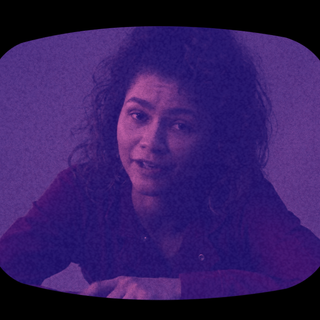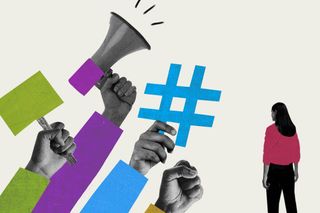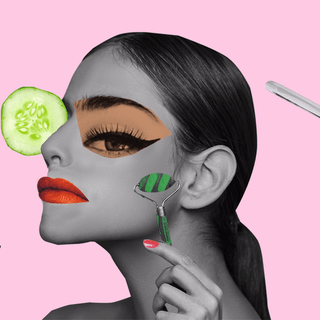
Our Activism Is Too Focused on Performance to Acknowledge Allies Who Aren’t ‘Vocally’ Woke
Sometimes we look down on people who don’t always say the right things, instead of checking whether they’re doing the right things.

Having received my autism diagnosis in my late 20s, I realized just how difficult it was to come out to my friends as neurodivergent. Interestingly, the process also helped me understand which of my friends truly were allies and which of them were simply paying lip service to conversations about mental health and social justice online for “woke points.”
The fact that people who say the “right” things don’t always practice what they preach is hardly surprising. Discourses on performative wokeness have become rather commonplace in the past couple of years — especially in the aftermath of George Floyd’s death that lead to celebrities, publications, brands, and even TV shows being called out for being performative. While pretending they support diversity, they were being racist in their recruitment decisions, displaying “selective solidarity and hypocrisy,” or even promoting colorism.
One of the reasons for these performances of wokeness is our societal need for allyship to be visible and overt. And in doing so, we may be ignoring actual allies in favor of performative ones and sidelining qualities like empathy and kindness simply because they may not be perpetually draped in woke-lingo.
The responses of my “friends” to both my diagnosis and my requests for accommodation included dismissive, sarcastic statements like: “It’s all in your head”; “By that logic, everyone’s a little autistic”; “Oh, do tell how many days advance notice we should give you for plans”; “Okay, and I have anxiety. So?” These reactions led me to really lower my expectations – especially since most of them were from people who talk about how it’s sad that as a society we don’t give mental health the importance it deserves. But last month, when I came out to a friend I hadn’t met in years, the conversation went nothing like that. I was given space to explain what I meant rather than being talked over, and when I explained the complexities of receiving a late diagnosis, I felt a kind of empathy I hadn’t from most people. Surprisingly, this was a person who hardly ever spoke about mental health or posted anything on social media that weren’t “travel pictures.”
But as I looked back at the spectrum of responses I had received from my friends — both when I came out as autistic, and a few years back, when I came out as bisexual — the ones that shone the brightest in terms of empathy and kindness were from people I’d least expected that from. And, each time, I was surprised.
As psychotherapist Zohra Master, an associate fellow and supervisor at the Albert Ellis Institute, explains, we tend to “believe” in the woke-ness that is “performed” for us. “The more vocal you are, the more confident you appear. And because you appear more confident, you seem to have more influence on other people, who believe you’ll be great at practicing what you claim too,” she says.
Related on The Swaddle:
The Pressure To Always Say the ‘Right’ Thing Affects the Way We Communicate
Further, while it may not be deliberate, our opinions of others are based on how well they articulate their thoughts, how well they can analyze social justice literature, and how much time and energy they can afford to invest in talking about allyship on social media — all of which are afforded by a multitude of privileges.
When one’s socio-economic conditions require them to work round the clock so they can afford the basic necessities of life – like food, medicines, and rent – how often would they have the bandwidth to spend hours writing essays on social media? While some do manage, many often strive to just do the bare minimum to be able to survive.
As a neurodivergent individual who struggles every day with processing information and communicating, it would almost be criminal for me to not acknowledge that great communication skills are a privilege too. Moreover, the fact that so many “woke circles” are dominated by individuals with an economically privileged, metropolitan upbringing, who attended English-medium schools, keeping up can seem “daunting” for someone from a smaller city with a not-so-great command over English — as I felt in the first few years of college.
But when faced with the need to be an ally to someone, would they shy away from it? Maybe. Maybe not. It depends on the person — neither on the things they post on social media, nor on the number of marginalized authors they can name.
Moreover, as Itisha Nagar, an assistant professor of psychology at the Delhi University, explains, “Being woke is a huge personal commitment — an intellectual as well as an emotional one — towards social justice.” She believes it’s an “evolution of the human mind” that comes from recognizing our privileges, unlearning a host of the things we’ve been conditioned to believe, listening to diverse voices, and understanding the nuances and complexities embedded within. But, perhaps, there is a “social pressure” the current culture of activism puts on people, who are making the effort to learn, to also put their hard work on display across social media.
But this culture – that creates pressure to not just be perpetually vocal but also say the “right” thing at all times – is rather unforgiving. We seem to have forgotten that humans make mistakes — especially when they’re in the process of learning. If they didn’t, well, we’d all be scoring 100/100 on our exams in school just by virtue of “putting in the effort.”
Related on The Swaddle:
Cancel Culture Cannot Be The Knee Jerk Reaction To Mildy Controversial Gaffes
What might make us even more prone to make mistakes is the hurry to choose sides — perhaps, as a result of the same social pressure that tells us if we don’t immediately criticize something, we’re “complicit” in it; or, maybe, because our limited attention spans are struggling to keep up with the barrage of updates from all over the world on every topic around the clock, Nagar explains. All the while, the threat of being “canceled” for making the smallest of mistakes, looms large.
“We are becoming a culture where we’re more open to reprimanding people than correcting them,” Master notes.
“In the age of social media, it sometimes feels like we’ve signed up for a reality show to find the most “woke” person in all of humankind. In this Bigg Boss-esque setting where our words are constantly being monitored, it seems as if the smallest of missteps will lead to an elimination a.k.a. ‘being canceled,'” as an article on The Swaddle stated.
It is this pressure to be vocal that can, in turn, discourage people from voicing their thoughts publicly. Master adds that, sometimes, the reason people aren’t vocal about certain issues is not that they don’t support them but because they believe it’s a given. “Sometimes, people who actually work towards being better allies, aren’t necessarily vocal about it because in their heads, they’re like, ‘Oh, but this is understood, no?'”
Having said that, it’s not like everyone who advocates for different causes on social media, or uses the platforms as an important part of their activism toolkit is merely “performative.” Moreover, activism on social media can actually be quite helpful. “Voices can be heard, and some small version of justice may even be served as a result,” Holiday Phillips, a sociologist, wrote in 2020.
It’s just also important to remember that not using social media as a mouthpiece is not a marker of how good an ally someone can turn out to be. As Phillips added, “We must not let the kind of performative allyship that begins and ends with hashtags take center stage in the quest for equality.”
Devrupa Rakshit is an Associate Editor at The Swaddle. She is a lawyer by education, a poet by accident, a painter by shaukh, and autistic by birth. You can find her on Instagram @devruparakshit.
Related


Is This Normal? “I Experience Life As if I’m Watching Myself in a Movie”
